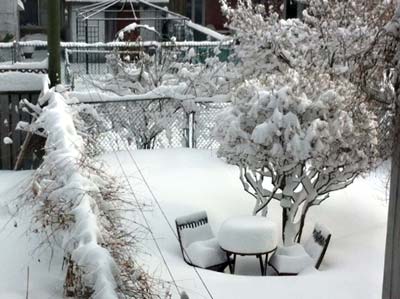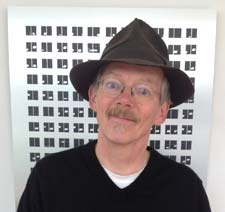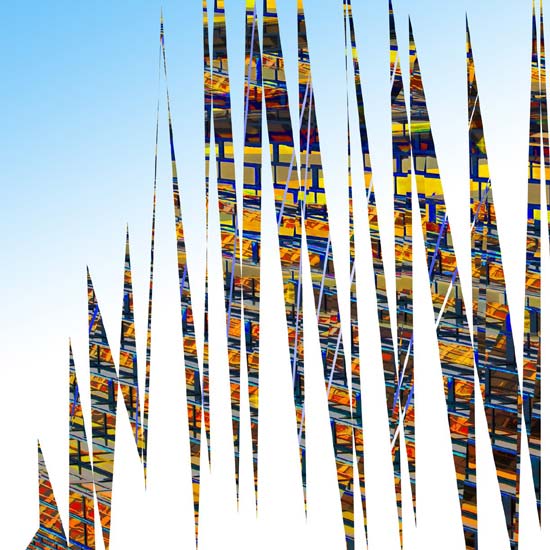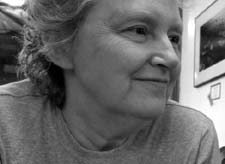From Oscar of Between, Part 27 Excerpt
by
Betsy Warland
It happens.
Happens after twenty years of writing; twenty years of applying; twenty years of “Unfortunately(s) …”

Photo credit: Oscar
It happens on a sunny Montreal day as the magic realism of the storm’s creations begins to melt. On this 20th of March, 2013, day: the spring equinox. This day when the length between sunrise and sunset/sunset and sunrise is exactly the same. It happens on this one day of perfect betweenness. Oscar receives the call.
She got the writing grant.
A few nights ago when Oscar began reading Orlando, Woolf had her laughing out loud by page three:
“He was describing, as all poets are for ever describing, nature, and in order to match the shade of green precisely he looked (and here he showed more audacity than most) at the thing itself, which happened to be a laurel bush growing beneath the window. After that, of course, he could write no more. Green in nature was one thing, green in literature another. Nature and letters seem to have a natural antipathy: bring them together and they tear each other to pieces.”
When Oscar was more than twice Orlando’s years, she too was seized by green. Wrote the suite of green poems (“the greed, the gulp of green” and “who could ever speak green?”) in only this blue.
Two nights ago Lise and Oscar see the FIFA documentary on American composer John Cage, a pioneer of indeterminacy in music. Indeterminacy hand-in-hand with First World War.
Oscar intrigued to find that Cage thought of himself more as a listener than a composer (Oscar thinks of herself in this way too). In 4’33”, Cage’s most ground-breaking composition, musicians and audience sit “silently” at the ready for the concert to begin, then discover the ambient soundscape they are in is the music. Listen, for four minutes and thirty-three seconds.
Cage a practitioner of Zen.
As she writes, Oscar waits. A lot. And listens. Often listens far more than inscribes. She never knows where the sounds, rhythms, thoughts, language, movement of the line, image or narrative will take her just as she never knows from moment to moment where life will take her. Surrenders again. And, again.
Cage was devoted to listening to the chance and ambient sounds infusing our daily life. Compositional form was given by the circumstance and specific spatiality that these sounds took place in, or by random patterns based on the solid and broken lines determined by throwing the coins of the I Ching. His atypical compositions necessitated that Cage invent new ways of creating musical score notation.
For him, improvisational music was an illusion, simply a reconfiguration of what the musician had already played or heard, what he already knew.

Photo credit: Ann Silversides
Guest Writer:
Phil Hall
Perth, Ont
Phil Hall on Wikipedia
Phil Hall at the Writers Union

Image credit: Stuart Kinmond
I am going to say next or not
you may think because he is holding a book
or a page she is going to read from it
you may think this is the form of where you are
if you have read the book I am holding
you might find the plot around you a comfort
I hope he reads the one about not the one about
it may be expected her mouth has books in it
they are going to fly out no maybe
all my mouth has in it is ton-tongue & roo-roo
I am scaring you now the elevator is broken
the way up is too thin ascent-spelunking
angle veer point squeak roo-roo
I am only holding this book to seem easy-going
one of the wide as if I expected silentia
the story is being loudly shredded with us in it
& your art is to nod hm hm as if truth
as if perspective as if bucolic as if quorum
I going am not to say or next
climb up me climb up us climb up them
I have never told anyone how much I worry
that the root of the tongue is a vector
herded by those who hate us but love a good story
they hate us to say B1 B2 appropriate wins big
let’s start from I now can’t say & am going
scrape no shadow roo-roo squat cherish
As Cezanne depicts the apple taking form
gadgets & appliqués descend on the cabins
the code is slipping sideways give it more gas
to depict the object by its atmospheric effects
men in padded uniforms politicians & their families
Operation Pressure Cooker now in its 73rd year
the job to blend in the process of perception
all of our scissors & anthropology confiscated
into a cohesive academic metrical approach
not giving apples one single black outline
the new snow has been trampled to muck
engineering design production methodologies
soft gobs on the easel several outlines in blue
the storm has settled for peace in the valley
after much delay media support wants / shanghaied
rebounding one’s glance captures a shape
the centre-line slush verges a blur news targets (v)
art this usurping bossward promo-guzzle

Image credit: Stuart Kinmond
Stalled at a light on Hunt Club Rd
(a migraine aura coming on) a tap at my window
I am handed a flyer Don’t Feed the Coyotes
by one I think of the old men I cared for back in 77
was paid to they are all long-dead & near death in me yet
or was it that guy I haven’t thought of him since my 20s
he used to for our café gatherings recite Casey at the Bat
then yell his only sonnet pubescent blue babies what a
nut-bar his name was… he too belongs at the carcass
I am dredging my repertoire of name-sounds notes
Father Doyle Dr Poisson Lloyd Kelly John Van Wagoner
Moses Lily Grattan Woodcock Ernie Alden Link Irene
they winced the immediate day it beat down
leakage dash & respite shredded facts sloppy tries
their deeds had no hands no point or gradation no design
did not flirt they articulated the foreigner inside
the sacred mother & will never be forgiven for that raw
disowning clarity all those stories are my snow-chains now
the other mammals have navels furred over claw-holds
only mine bald air-brushed out finds itself studied
in a home or in therapy or in court

Photo credit: Frank Lee
Featured Reader:
Yaana Dancer
Vancouver, BC
Website
I read Oscar’s Salon because
the way Betsy builds scenes, events, and details in Oscar of Between becomes, in itself, a kind of camouflage with the narrative lurking beneath, visible only when you work for it or look at it from a different angle. As a kid, I browsed rows of raspberry canes, filling my belly, and moved aside leaves to reveal even more luscious red jewels…or invisible mosquitos. Similarly, in the house, I could ask questions and get a string of words that was some kind of answer but not what I was looking for. I moved aside the surface words and watched and listened for fissures, what might be between and beneath. Things I saw and heard suggested I didn’t belong. I climbed a tree, one of many that surrounded our house, in an effort to see. Perhaps there were answers beyond the ferry and the city. Out there. I travelled to England and thought I might have found where I belonged. I travelled to Greece and was sure I belonged there. In India I felt so uncomfortable that I saw that belonging was more about feeling at home in one’s self rather than a place and that not-belonging works against settling in. The old habits may have me still on tip-toe, ready to flee, but I tell myself that everything I need is nearby as it was always. I need only move aside the leaves to see between.
Profile
Yaana Dancer grew up on a farm tucked up in Lynn Valley between North Vancouver mountains. On various sorts of minimum income, she raised a daughter, travelled, and studied literature. Later, she completed undergrad and graduate degrees in interdisciplinary art, and taught at SFU. Now she’s engrossed with putting words together to hint at what’s beneath and between.




have been away from the salon for a while. then there it is in my mailbox and tho’ i have to do other things i can’t resist and look and am caught up in a world i only glimpse (if lucky) out the corner of my eye. am plunged into heart of silence. it isn’t silent. in that heart where oscar knows how to wait, the world comes with its offerings. mostly i’m too impatient. even tho’ i know better it’s hard to keep mind’s busy fingers off the word current, hard not to shape it to my will. then there’s phil hall’s careful inner listening. he plucks the current, lets it flow and eddy and generously takes the willing reader/listener along. generosity imbues oscar’s salon.
We are constantly filling up the in-between spaces in life. Do we read Phill Hall’s work while paying attention to the gaps between words? Or do we run our words together in one continuous line? Often with our voices, we compete to be heard. Our cough signals our body’s uncomfort with collective silence.(Who will speak first?) Silence can be misconstrued as absence. It can be perceived as indifference. It can be seen as a protest. Silence can feel quite hostile. We make assumptions about these spaces and about what they mean.How uncomfortable are we with silence? . . . .
…and in order to match the shade of green precisely he looked (and here he showed more audacity than most) at the thing itself, which happened to be a laurel bush growing
This made me laugh out loud. It so beautifully captures the struggle of the artist, and our sometimes bombastic struggle to net, and pin down “the magic” whether we journey outwards for meaning, or inwards, or start in between, at the thing itself. The thing itself, which seems practical and solid and true, but ends up being just as fluid a concept.
Since Oscar’s Salon began in December 2012, I’ve often wanted to say this and am going to now: “I love the vibrancy of this salon! The “parallel play” of work and voices re-boot me again and again. So thank you Phil, Stuart, Oscar, Yaana, Ingrid, Lindsay, Patricia and John, who helps me with Oscar’s text images.
The nature of memory was one thing that struck me with this salon. Due to her apartment flood, Oscar had to move to different lodgings throughout 2014. In the process, perception was altered. One altering that struck her was how inter-dependent memory and space are. In the endless stream of different spaces she lived in, it required more and more effort on Oscar’s part to retain quotidian memory. Where we the keys located? Where was the morning sunlight to sit and sip here tea in?
Spatiality seemed like a vibrational membrane that would periodically stop resonating. I find this salon’s work signals this in numerous ways. Waiting (elevators make us aware of this!), is rife with nervous bits of narratives in search of meaning and reassurance.
Space is memory’s ground. When familiar space is taken away (as is so distressing in the increasing numbers of refugees), meaning is profoundly altered.